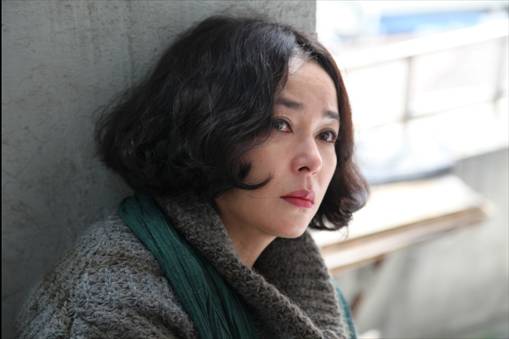
Pieta Review
South Korean director Kim Ki-duk, while not the popular director in his home country as he is around the world, on the festival circuit and with the arthouse cinema crowd he has remained for the past 10 years on the top of his game. His films always have an element of danger to them – even when he has dealt with sensitive subjects such as Buddhist monks living in rural surroundings in the beautiful Spring, Summer, Autumn, Winter…and Spring (2003) there is a sense of impending danger to animals and nature. A random bunny, eel and chicken face the same fate, let alone people in Kim Ki-duk’s latest release, Pieta. The difference here is that violence is at the heart of this film but not in the way you would expect from what has been dubbed as Asian Extreme. Pieta opens with a pre-credit establishing scene as we see a wheelchair bound man hanging himself with chains around his neck. The next shot moves to our principal lead, Lee Kang-do (played by Korean TV star Lee Jung-jin) lying asleep on a mattress on the floor in his filthy and messy apartment in the slum Seoul suburb of Cheonggyecheon dry humping a pillow while still asleep. Lee is woken from his sleep by his boss for his next assignment, for Lee works as a debt collector for a loan shark. It becomes apparent as we are introduced to Lee and his interaction with those poor people he collects his debts from that he prefers violence than actually collecting the money, be they cripples or those with their elderly mothers. He commits his violence coldly and without compassion. One day Lee is visited at his flat by an elegant and attractive woman begging for his forgiveness. He shuts the door on her hand but she stoically accepts the pain until he acknowledges her. Over the next few days she persistently shadows him until it virtually drives him crazy. He gradually begins to accept that the woman might be telling the truth, but not until he has sexually assaulted her (stating “I came out of here and now I want to go back in”) in a disturbing piece of incest (Ki-duk is true to form here as he challenges his audience) and cuts a piece of flesh from his side and forces her to eat it. The woman moves in with him and so begins Lee’s slow rode to atonement.
After the release of his last film, Arirang, a documentary following the director’s own nervous breakdown and collapse which seemed to fail with audiences and critics alike, he seems to have returned to the type of film that made him popular, Bad Guy (2001) in which a nice girl is persuaded to become a prostitute. Both films seem to have a great in common with each other, particularly in their use of graphic violence. The violence here though mostly happens in our minds, for as terrible as it might be, it mostly happens off-screen but the threat – even to a small bunny is ever present, perpetrated by an amoral character but we fill in the images of those acts of violence in our minds. And this is of course at the heart of the film as his mother not only seeks her son’s forgiveness but is equally an active participant in his violence.
The title (as well as DVD cover and poster) gives away who the mysterious woman is. In this sense it looks like Kim Ki-duk is playing with his audience (in classic art history Pieta, Latin for pity, is the pain felt by the Virgin Mary for her son’s death as he is brought down from the cross) but we never really get any resolution of the reason or motivation of her abandonment of her son and this is perhaps another aspect of the director mocking his audience. But despite the severely dislikeable main character, Jung-jin never really seems as threatening or as menacing as he should. Cho Min-soo as the mother on the other hand is very good, if only marginally sympathetic,perhaps due to her participation in her son’s violence and her desperation to be with a son that that only a mother could love.
Chris Hick

